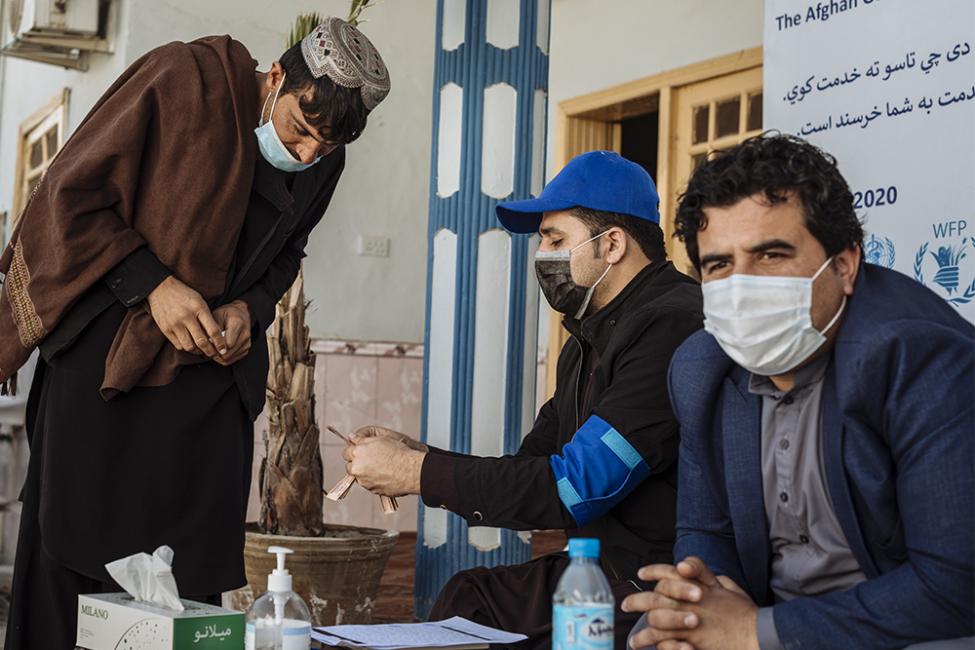-
Who we are
WHO WE AREThe International Organization for Migration (IOM) is part of the United Nations System as the leading inter-governmental organization promoting since 1951 humane and orderly migration for the benefit of all, with 175 member states and a presence in 171 countries.
-
Our Work
Our WorkAs the leading inter-governmental organization promoting since 1951 humane and orderly migration, IOM plays a key role to support the achievement of the 2030 Agenda through different areas of intervention that connect both humanitarian assistance and sustainable development.
What We Do
What We Do
Partnerships
Partnerships
- Where we work
-
Take Action
Take Action
Work with us
Work with us
Get involved
Get involved
- Data and Research
- 2030 Agenda
Record Cross-Border Migrant Returns Contribute to Bleak Humanitarian Outlook for Afghanistan in 2021
Kabul – Over the last year, more than one million Afghan migrants have returned or been deported to Afghanistan from neighbouring Pakistan and Iran as COVID-19 continues to deprive many of employment and health care.
The International Organization for Migration (IOM) estimates that more than 650,000 undocumented migrants will return in 2021 – all of whom will be in dire need of humanitarian support at a time when donor funding is a small fraction of what is needed.
As of 11 March, IOM reports that over 200,000 undocumented Afghan migrants have returned since the start of the year. This is more than double the rate of return over the same period in 2019 and 2020. Around half of these returns have been deportations in recent weeks.
The elevated numbers of people coming back into the country is expected to remain high through the month of March due to religious holidays in Iran, during which many people travel home to see loved ones.
“Desperation among the poor in Afghanistan has been growing over the years as there are fewer job opportunities at home. Many Afghans have no choice but to migrate to urban areas or other countries in search of a safer place to live, healthcare and education,” said Nicholas Bishop, IOM’s Cross-Border Response Programme Manager.
“We are now seeing an increasing number of migrants returning back to Afghanistan, as COVID-19 has destabilized economies where undocumented Afghans have limited access to health care due to their legal status. The situation is becoming more dire by the day.”
Many Afghan migrants return home with only the possessions they carry on their backs. Most have taken out significant loans to journey abroad in the first place and suffered from abuse during their time outside of the country.
Outsized cross-border returns are one symptom of a much larger problem. This year, as many as 13.2 million people are expected to suffer from a widespread drought and famine-like scenario, according to the newly released OCHA’s Afghanistan Spring Contingency Plan.
Combined with escalating levels of conflict and the ongoing consequences of COVID-19, the likelihood of additional waves of internal displacement, cross-border migration and a spike in humanitarian needs is high. Unfortunately, the Afghanistan Humanitarian Response Plan for 2021 is only 5 per cent funded as of 9 March.
IOM, together with the Ministry of Refugees and Repatriation and humanitarian partners, delivers humanitarian assistance and other services to returnees at major international border crossings with Iran and Pakistan. A network of transit facilities provides overnight accommodation, hot meals, health and protection services, and transportation support.
However, limited funding means that only 5 per cent of undocumented returnees receive the support they need each week.
As of 9 March, Afghanistan has officially confirmed over 55,000 COVID-19 infections at present with 2,450 deaths. Due to limited funding for the country’s COVID-19 response, the true rate of unrecorded infection is believed to be in the millions, according to Ministry of Public Health and WHO officials.
Despite the delivery in recent weeks of vaccine supplies from India and the COVAX Facility – the multilateral mechanism created to ensure equitable distribution of the COVID-19 vaccines among countries – and the start of a nationwide vaccination campaign, the identification of new viral variants is deeply concerning for Afghanistan, as vaccines are unlikely to be widely available until 2022 or later.
Under multi-donor funding contributions, IOM has deployed over 380 staff to support COVID-19 response efforts and ensure the continuation of basic primary health care in areas where hospital visits have declined by more than 25 per cent in the face of infection among health workers and rampant conflict.
Later this month, IOM will issue its global 2021 Strategic Response and Recovery Plan, highlighting IOM’s approach to address the urgent humanitarian consequences of the pandemic, as well as the medium to longer-term socioeconomic interventions required to ensure the resilience of affected populations in Afghanistan and beyond.
IOM Afghanistan is seeking USD 17 million in 2021 to respond to COVID-19.
For more information, please contact Nicholas Bishop, Emergency Response Officer, IOM Afghanistan, Tel: +93794445948, Email: nbishop@iom.int or Angela Wells, Public Information Officer, IOM in Geneva, Tel: +41 79 403 5365, Email: awells@iom.int.
